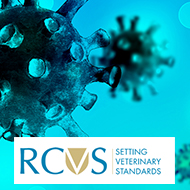RCVS updates COVID-19 guidance in light of Welsh ‘firebreak’

The updated gudance reflects the two main types of government restrictions a practice may be working under.
The RCVS has further updated its key guidance on COVID-19 in light of new government restrictions.
The updated guidance comes in response to the new two-week ‘firebreak’ lockdown in Wales, and the potential for tighter lockdown restrictions in the rest of the country, the College said.
It comprises two flowcharts and two sets of temporary guidance on remote prescribing to reflect the two main types of government restrictions a practice may be working under. They are:
‘Circuit-break’ or ‘Firebreak’ lockdown conditions: FAQ2a and FAQ4a
A ‘new’ flowchart which broadly represents a return to the College’s original guidance in April to undertake essential and emergency work only and with a temporary option to remote prescribe POM-Vs at an earlier stage, subject to certain conditions*.
Tier 1, 2, or 3 restrictions: FAQ2b and FAQ4b: The current flowchart which incorporates all of Council’s recent changes, including an expectation that a veterinary surgeon should first endeavour to bring an animal under their care before considering prescribing POM-Vs remotely, subject to certain conditions.
RCVS President Dr Mandisa Green said: “I would like to reassure my colleagues once again that we understand the extreme challenges and difficult decisions they are facing.
“The College has no interest in taking anyone to task for considered professional judgement, providing they act reasonably in the circumstances, can justify their actions and take reasonable notes.
“Sadly, we’re seeing the pandemic situation deteriorating again in the UK, but to varying degrees across the country. This presents a significant challenge in ensuring our guidance is clear and straightforward while remaining relevant to as many people as possible.
“We sincerely hope this new guidance achieves that aim and supports veterinary professionals working to uphold animal health and welfare while maintaining the safety of their teams and clients.”
The RCVS adds that it will be reviewing the details of a new five-tier system for Scotland, announced on Friday (23 October, and will update its guidance accordingly.
* These conditions are set out in FAQ4a&b and include a recent requirement introduced by RCVS Council (effective from 1 November) for anyone remotely-prescribing POM-Vs to also provide a 24/7 follow-up service involving physical examination, plus or minus further investigation, if required. This follow-up can be provided personally by the veterinary surgeon or practice, or by written agreement with a veterinary services provider that is local to the client.



 The latest
The latest